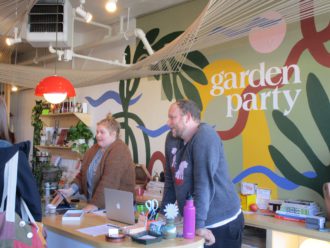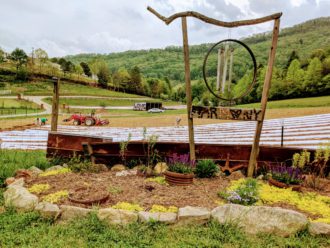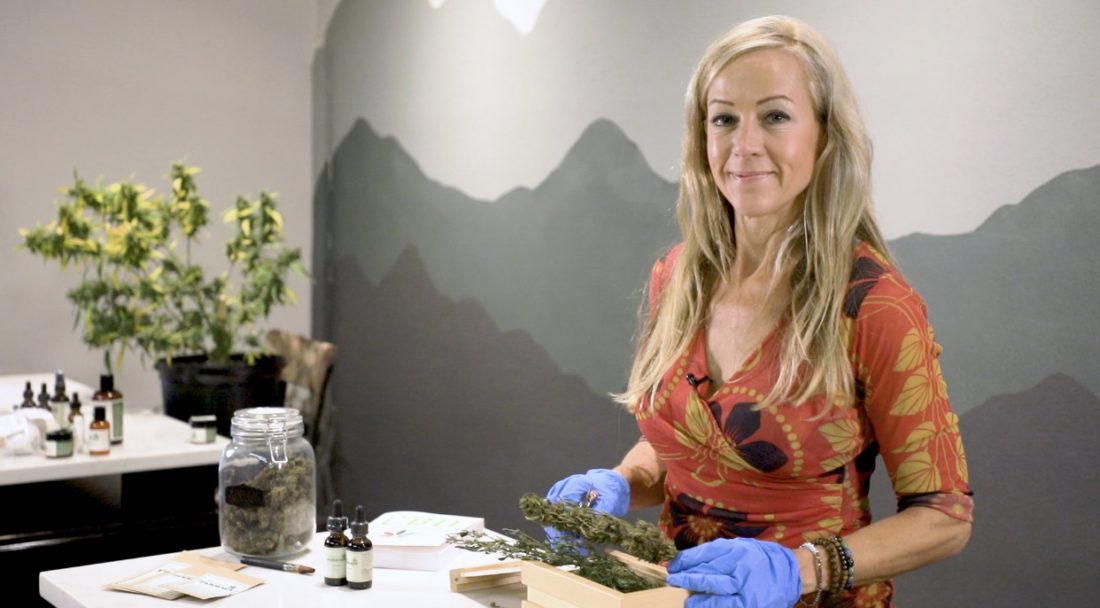Cannabidiol, or CBD, seems to be everywhere these days. In Asheville, neon signs flash in storefront windows: “We have CBD.” Gift shops sell CBD-fortified soaps and moisturizers, and some local spots serve the substance up in food and cocktails.
CBD is the naturally occurring chemical found in hemp — the nonpsychoactive cousin of marijuana — that manufacturers are heralding as a “miracle” for ailments ranging from anxiety to insomnia. Businesses in North Carolina and across the country are cashing in on its acclaim.
“CBD isn’t a secret thing that you have to hide in the garage. People put it on their pizza, people bathe with it, people put it in their drinks,” says Seth Connelly, operations manager at Blue Ridge Hemp Co. “Cannabis is a plant that can help us live our best lives, and it’s accessible. We just have to be OK with it being there.”

Connelly also co-owns Garden Party, a lifestyle boutique on Haywood Street. In November, the store hosted a CBD-infused pizza party. Garden Party co-owner and creative director Tarleton Walmsley says they’re hoping to normalize cannabis.
“Owning a small business is a form of activism,” Walmsley says. “There’s a lot of potential for this business to grow as a community, and that’s what’s exciting to me.”
Lawful orders
Use and sale of CBD is legal in 45 states, including North Carolina, as long as its THC content doesn’t exceed 0.3 percent. Under federal law, the substance is still considered illegal, but that doesn’t seem to be deterring growers and business owners from expanding their investment and development of CBD and CBD products. Blue Ridge Hemp recently opened a dispensary on Lexington Avenue that sells the CBD flower and pre-rolled joints.
“You can go downtown and take a rip,” Connelly says. “It’s just about being upfront. We’re not doing anything shady. It’s just business.”
Walmsey adds that, if businesses like Blue Ridge Hemp or Garden Party uprooted and moved to a state where marijuana is legal, people in those states wouldn’t bat an eye. “We wouldn’t really stand out.”
Which begs the question: Are CBD businesses laying down the tracks, preparing for an expansion into legal marijuana? The answer depends on whom you ask. Connelly says that’s the long game for Blue Ridge Hemp.
“We’re trying to make moves to run it like a real cannabis company, like in California,” Connelly says. “So when it does change at a federal level, we’re ready.”
Thousands of uses
Franny’s Farm, another Asheville-based hemp company, just opened its second dispensary. Owner Frances Tacy says if medical or recreational marijuana became legal in North Carolina, she’d add marijuana products to her retail offerings, but she would continue focusing her energy on growing hemp.
“CBD is what I like to use. It has thousands of uses that marijuana will never be used for,” Tacy says. “I’ve seen it help people, and that’s who I want to continue to serve.”

In 2018, North Carolina’s first full hemp growing season, it’s been a lucrative business for Franny’s Farm, too. Tacy says she planted two quarter-acre plots, as well as a small demonstration garden that included 50 additional plants. After September’s harvest, the crop yielded about 1,000 pounds of hemp flower. Tacy says she anticipates this year’s sales will exceed $1 million.
“We’ve gone from one employee — me — to putting money into about 160 different people’s wallets,” she says. Franny’s Farm is several businesses rolled into one, including agritourism, special events, farming, distribution and retail. The hemp company grows and makes its products, essentially securing its own supply chain.
Even in states where recreational marijuana is legal, some companies are strictly sticking to CBD.
Health without the high
One Colorado-based company, High Plateau Pharmaceuticals, is even looking to expand its CBD product manufacturing to the East Coast. CEO Robert Mussen says despite the legalization of recreational marijuana in his state, he’s focused on selling and marketing products strictly containing CBD, like tinctures and creams.
“It has all the health of marijuana, without the high,” Mussen says.
Mussen says since he started his company four years ago, business has grown threefold. High Plateau Pharmaceuticals plans on opening an East Coast facility in South Carolina next year, he says, and hopes to expand into WNC sometime after that.
“I got into the market four years ago, and it was crickets. It has slowly gotten busier, especially this year, but it’s still the tip of the iceberg,” Mussen says.
There’s still plenty of room for the budding industry to expand, particularly in the Southeast, says High Plateau’s communications director, Tom Crosby.
“North Carolina is a fairly conservative state, and there’s still that aura hanging over it that CBD and marijuana are a bad thing,” Crosby says. “We need to get beyond that and see that people are actually feeling better taking it and healing, in many respects.”
Burden of proof
But claims about CBD and its purported health benefits are largely anecdotal. Some preliminary studies involving mice have shown links between CBD intake and a reduction in symptoms of anxiety disorders and inflammation. Some of the strongest clinical research on human patients focuses on rare childhood epilepsy syndromes. A 2017 report found that patients given CBD oil saw a 40 percent reduction in seizures, compared to 17 percent in patients who received a placebo (avl.mx/5g1).
The study’s authors concluded: “These are exciting times for research in cannabinoids. After almost four millennia of their documented medical use in the treatment of seizure disorders, we are very close to obtaining conclusive evidence of their efficacy in some severe epilepsy syndromes. The era of evidence-based prescription of a cannabis product is within our sight.”
Industry experts, business owners and lawmakers who support CBD seem to agree that more research needs to be done. While manufacturers and users of CBD and cannabis products report drastic improvements in certain health conditions, none of the claims have been approved by the U.S. Food and Drug Administration.
“A good immediate step would be a comprehensive study done by state agencies, like the Department of Agriculture and the Department of Health and Human Services,” Rep. Brian Turner, D-Buncombe, says.
Turner is one of the founding members of the so-called “Cannabis Caucus,” a cohort of state lawmakers who support the legalization of medical marijuana. Last year, he was a co-sponsor of House Bill 185, which would decriminalize the purchase or possession of “an adequate supply” of cannabis for a qualified patient or their caregiver.
Along with two other bills related to medical marijuana, HB 185 remains in committee for the foreseeable future.
Turner says given the state legislature’s conservative majority, legalization of medical marijuana “isn’t even on the horizon at this point.” Instead, he says, he’s focused on legislation that would support the CBD and hemp economy in North Carolina, including growers and manufacturers.
“As we go back into session [at the end of January], we’ll be looking at things like the regulatory framework, whether it’s adequate or too burdensome,” Turner says.
Better alternative?
Turner says he’d also support a study on medical cannabis, particularly as an alternative to opioids.
That seems to be a major selling point for CBD users. Cannabidiol interacts with receptors in the brain that play a role in controlling physiological responses like pain, mood and inflammation. As patients become more aware of the risks of controlled substances such as opioids and stimulants, they’re increasingly turning to alternative remedies for relief.
For one Ashevillean, CBD is a godsend.
“It’s impacted my life. I really cannot explain how grateful I am for CBD,” Grace says. Xpress is using a pseudonym to identify Grace because she fears losing her job at a rehab center. The smallest trace of THC in a drug screening could result in her termination.
“I’m definitely worried, but at the end of the day, the health benefits that I receive from CBD outweigh my job,” she says. “I know that sounds crazy and unrealistic, but it’s true. If I would have to make a career change, then that’s what I would have to do at this point.”
Like many of the patients she sees, Grace has struggled with addiction. Altogether, she’s been in recovery for nine years. She relapsed for four months, but has stayed clean for the past two years. Grace is emphatic: Her daily CBD regimen has been instrumental to her success in managing pain and anxiety.
The supplement boosts her sense of well-being. “I don’t feel the need to take benzos for anxiety or stimulants for my ADHD,” she says.
Most of the clients she sees are struggling with addiction to opioid painkillers and benzodiazepines, like Xanax and Ativan. Grace says she believes CBD could benefit the patients at the clinic, but she can’t advise them to try it.
“I’ve even seen clients get put out of treatment centers for testing positive for THC, while they say they’ve only taken CBD,” she says. “There’s no way to rule out someone who’s smoking marijuana illegally versus someone who’s taking a full-spectrum CBD oil that’s legal.”
Grace has been taking CBD oil for the past two years at the insistence of her mother. She experimented with different brands and potencies until she found what works well for her body. She estimates she spends about $50 — the typical cost of a bottle — every four to five days.
“This stuff works,” Grace says. “Maybe not for everyone. I’m not saying it can cure everybody’s ailment, but it can make a huge impact and a huge difference.”




Nothing but snakeoil. ZERO scientific evidence to support CBD having any health benefit. I know, I know…it cures cancer, aids, and numerous other ailments according to the very smart Asheville nit wits.